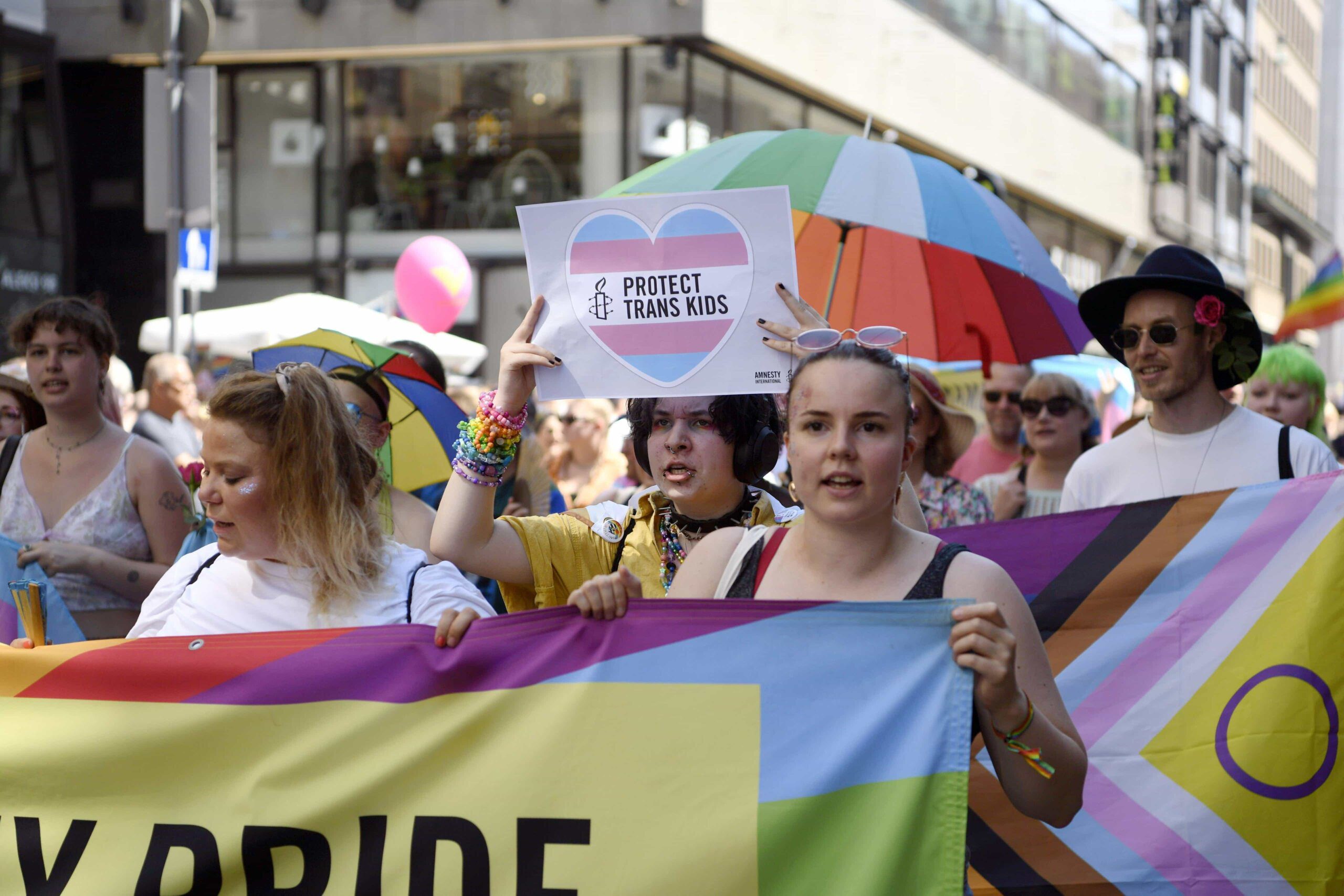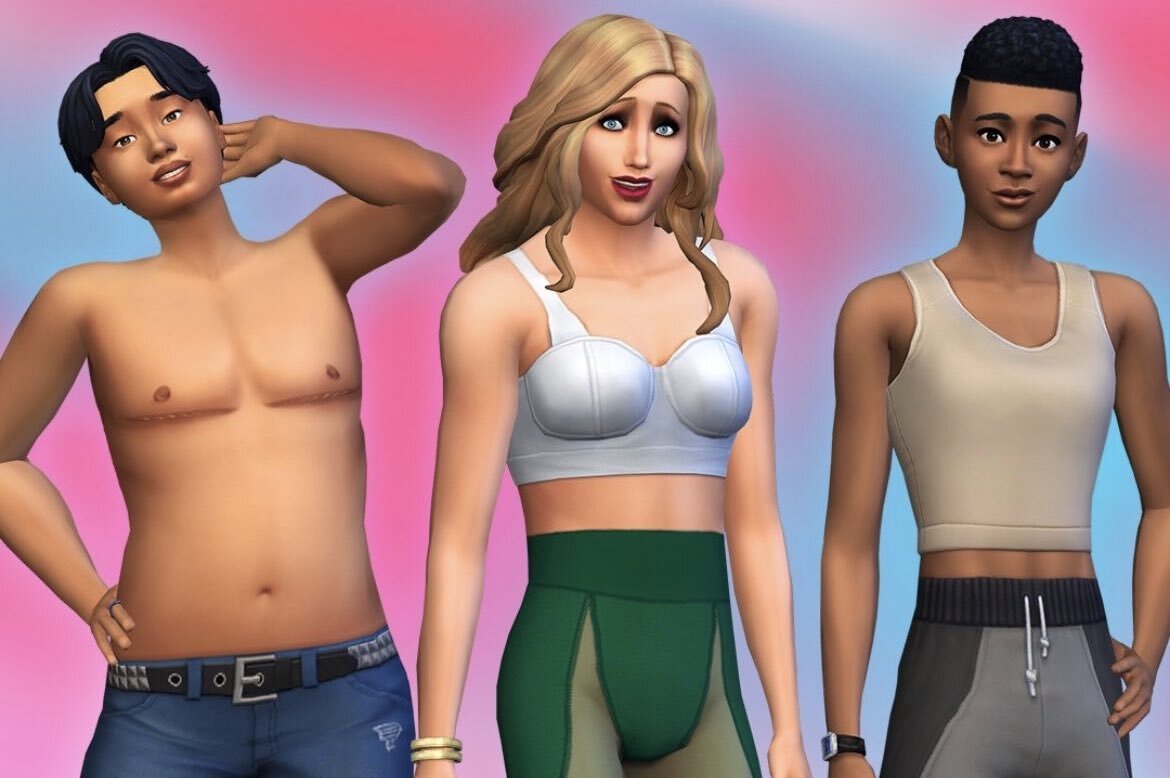Happy Friday, queers! We know you’re raring to rush off to your weekend dance parties (or sleep-ins, #gayandtired), but before you do, here’s a roundup of six LGBTQ2S+ news stories you might have missed.
1. The Sims added top surgery scar and binder options in its newest update
In case the latest episode of The Last of Us wasn’t enough gaymer action for the week, The Sims released a new update, The Sims 4, which includes customization options for top surgery scars and binders, a move that greatly expands trans representation within the game. The Sims, for anyone who doesn’t know (are there any such people left?) is a life-simulation video game that was released in 2000 and has remained popular ever since. While virtual reality games have long allowed queer people to more safely explore their identities, the explicit inclusion of trans bodies in this update is being celebrated by queer Sims enthusiasts.
“By including explicit, real-life markers of transness in the Character Creator [the part of Sims where players customize their avatar], the game allows us to see our own bodies as part of our fantasy, not something we have to leave behind,” Addie Barron, a trans woman and Sims player, told the Philadelphia Inquirer. “The Sims is hugely popular and it has a lot of power to set standards in the culture and industry of games.” Also—it’s free! Weekend plans unlocked.
2. Finland has finally done away with its archaic gender-recognition practices

Credit: Saara Peltola/Lehtikuva
On Wednesday, Finland passed a new gender-recognition law that will allow adult residents to change their legal gender through self-declaration. Up till now, anyone in Finland seeking to change their legal gender markers would have to undergo a psychiatrist evaluation and, horrifically, prove that they are either infertile or have been sterilized—a system that, as Amnesty International has pointed out, breaches the European Convention on Human Rights. Under this new law, which is expected to take effect as soon as possible, gender recognition will be given to adults upon written request, and after a mandatory 30-day “period of reflection.”
“The vote comes as a result of more than a decade of campaigning by civil society groups, and is a testament to the commitment of activists who have fought long and hard—often in the face of toxic rhetoric — to see this day,” said Matti Pihlajamaa, Amnesty International Finland’s LGBTI rights advisor, in a statement. However, Pihlajamaa also noted that by excluding anyone under 18 from the effects of this law, the Finnish government is still violating the UN Convention on the Rights of a Child.
3. The Virginia Senate killed six proposed anti-trans bills
Yesterday, the Virginia Senate Education Committee voted to kill six proposed bills from Republican lawmakers that would have (surprise, surprise) infringed on the rights of trans minors in the state. Three of the proposals were aimed at outlawing healthcare for trans minors, while the other three attempted to block trans youth from joining school sports teams that align with their gender. The Democrat-controlled senate voted in all cases to mark the bills PBI—meaning “pass by indefinitely” (werk).
In a tweet, Equality Virginia, a local advocacy organization, said that senate committee members had received 3,000 emails in opposition to the bills killed on Thursday. “Thank you to everyone who has spoken up against these bills,” they wrote. “Virginia is remaining a better, more inclusive state because of your efforts.” However, they also reminded us that the fight for trans rights in Virginia is not over—an especially poignant message given that school guidelines in the state still prohibit trans students from using services that match their gender, allow teachers to misgender students and require that parents be informed of any information about their child’s gender identity.
4. Florida may require high school athletes to answer questions about their menstrual cycle
And here’s your almost-daily hit of bad news coming out of Florida—we wish we were shocked. The latest from the increasingly dystopian state is that high school athletes may soon be required to answer invasive questions about their menstrual cycle, a move that’s already being criticized as an attempt to out trans youth and block their participation in school sports leagues. While questions about young athletes’ menstrual cycles have been optional for some time, a new draft of the Florida High School Athletic Association (FHSAA) physical health form would make it mandatory for students to disclose if they’ve had a period, and if so, when their most recent was and how regularly they have them. Their answers could determine whether or not they are allowed to participate in high school sports.
“This is clearly an effort to further stigmatize and demonize transgender people in sports [and] meant to further exclude people who aren’t assigned female at birth in girls sports,” Maxx Fenning, president of PRISM, a Florida non-profit that advocates for LGBTQ2S+ youth, told the Tampa Bay Times.
While the FHSAA has already recommended the change from optional to mandatory be made, its board of directors will make a decision about it at the end of this month.
5. The U.K. got its first LGBTQ+ rape and sexual assault helpline
Alright, let’s turn to some better news, shall we? Yesterday, Galop, a U.K. charity that supports LGBTQ+ people who have experienced abuse, launched the country’s first helpline dedicated to helping LGBTQ+ survivors of sexual violence and abuse. Research conducted by the charity found that 53 percent of LGBTQ+ people in the U.K. had experienced sexual violence and, of those who had, more than half felt their assault was linked to their identity. Of those surveyed who sought support, only 22 percent were satisfied with the services they received. The Galop helpline aims to create a resource that is free of LGBTQ+ discrimination, and where users won’t have to fear being outed.
“Over the last decade, sexual abuse and the impact it can have on a person has received more awareness than ever before. Yet, the queer community has largely been invisible in these conversations,” said actor and LGBTQ+ activist Michael Cashman in a statement. “The launch of a helpline run specifically for LGBTQ+ people is groundbreaking.”
The helpline will be active Monday through Friday over phone, email or web chat. Details are available here.
6. A gay man is suing Canada over policies that restrict some LGBTQ2S+ people from donating sperm
Here at Xtra, we stan queer parents—but unfortunately, sperm-donation policies in Canada do not. Health Canada is re-examining its policy on sperm donations after a gay man, Aziz M, filed a lawsuit against the federal government, which prohibits men from donating sperm if they’ve slept with another man in the last three months. Aziz M, whose full name is being left out of reports due to privacy concerns, is uniquely positioned to champion this cause. Before coming out as a gay man, he donated sperm several times and, as a result, a lesbian couple used his sperm to have their daughter. He now plays an active role in her life (adorable!). Unsurprisingly, after coming out, it became clear to him that the current sperm-donation policy is, well, bogus.
“[It’s] like you’re undesirable because of your gayness as a donor,” Aziz M told CTV News. “It feels like such an arbitrary rule.” While the current policies don’t mention non-binary or trans donors, it also applies to anyone that Health Canada would deem “male,” according to CTV News.
As a response to his suit, Health Canada, Canada’s minister for Women and Gender Equality, and Canada’s justice minister have committed to reviewing the current policy. Lawmakers, if you’re reading this—more queer families, please!


 Why you can trust Xtra
Why you can trust Xtra


